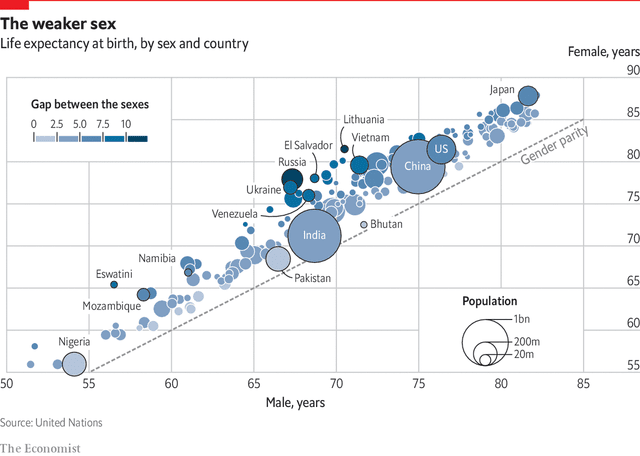For the same reasons that women live longer: booze, bravado and biology
MEN ARE around 1.7 times more likely than women to die from covid-19, according to a recent paper by researchers at Yale University, published in Science. Men older than 30 have a significantly greater mortality risk. That is striking, but perhaps should not come as a surprise. Human lifespans have climbed steadily in recent decades, but wide disparities remain between women and men (see chart). Globally women live nearly five years longer than men, up from three years in 1950. The reasons for that gap are both biological and environmental, and help to explain why more men are dying from covid-19.
For one thing, men smoke and drink more. In Russia, where male drinkers outnumber female ones by four-to-one, alcohol was responsible for about three-quarters of all deaths among working-age men during the 1990s, widening the gender gap in life expectancy to more than 12 years. It is now down to ten years, the same as in neighbouring Belarus and Ukraine, thanks in part to a big reduction in drinking. Boozing contributes to conditions such as heart disease and liver cirrhosis. These sorts of comorbidities make it harder for men’s bodies to fight off a disease such as covid-19.
Aggressive and risky behaviour also plays a role. Men are more likely to die violently, in car crashes or in other accidents. In El Salvador, one of the few countries where the life-expectancy gap between the genders has increased since 2000, gang violence is partly to blame. Men are also less likely to seek medical help than women. This may explain the large disparities in countries with high rates of HIV/AIDS and tuberculosis, such as Eswatini, Mozambique and Namibia. Women in sub-Saharan Africa are more likely than men to get diagnosed, start treatment earlier and stick to it. The result is that women account for 59% of HIV infections, but only 47% of HIV-related adult deaths. When it comes to covid-19, this combination of risk and recklessness may result in more men exposing themselves to the virus and leaving it too late to seek treatment.
Yet there are biological differences between the sexes, too. Women have stronger immune systems, thanks in part to oestrogen, a hormone that stimulates the body’s defence response. Double copies of X chromosomes also protect women from genetic mutations and are responsible for immune-related genes. And the authors of the Science paper note that detrimental effects of ageing on the immune system typically occur five to six years earlier in men than in women, making it harder for men to fight off diseases as they get older.
Men should not take these factors as a death sentence. They can improve their chances of beating covid-19, and extend their expected lifespans, by living more healthily, taking fewer risks and seeking medical care. But women will probably continue to outlive men—and to survive covid-19 in greater numbers.
By The Economist





